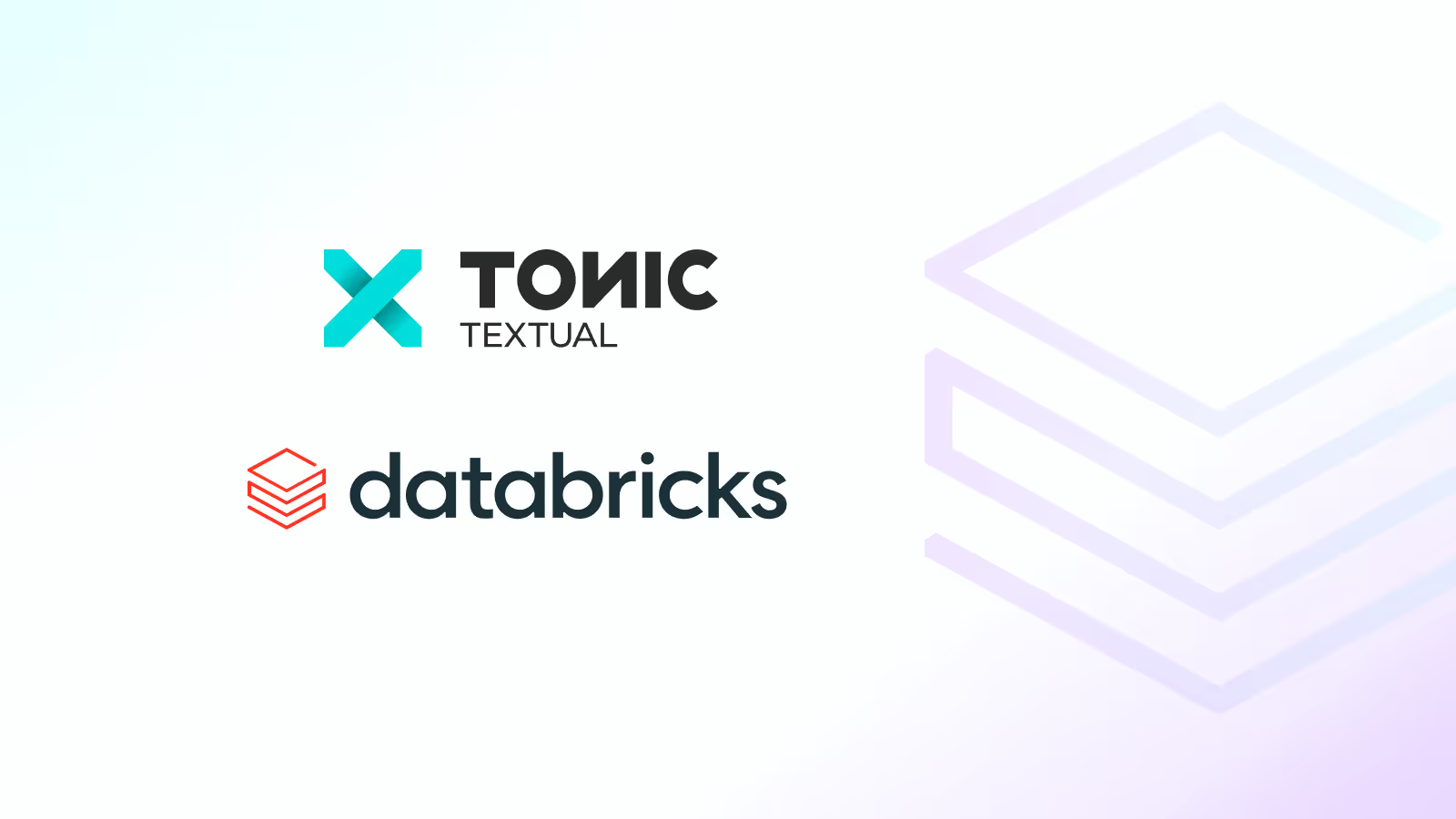Why your competitors are investing in Tonic.ai—and why you should, too

Enterprise data platforms have become essential infrastructure for modern engineering organizations, enabling teams to integrate, process, and analyze data from disparate sources to drive innovation and business growth. While your competitors are rapidly adopting enterprise data platforms to gain strategic advantages, many are discovering that without proper data privacy solutions, these investments fall short of their potential.
This is where Tonic.ai’s platforms for data de-identification, synthesis, and provisioning deliver exceptional value. For structured data de-identification, Tonic Structural is an essential EDP component that addresses the critical need for high-quality, de-identified test data to maintain regulatory compliance across development environments. Its counterpart for unstructured data de-identification and synthesis, Tonic Textual, offers the same value in AI workflows, in particular in securing sensitive data for AI model training, LLM privacy layers, or RAG system implementation. And for structured data provisioning, Tonic Ephemeral makes it easy to spin up and down temporary databases for development on demand.
Key points we'll explore:
- The strategic benefits of enterprise data platforms for development teams
- How Tonic Structural enhances EDP capabilities through specialized data solutions
- Creating secure, production-like environments with Tonic.ai
- Real-world examples of how industry leaders leverage Tonic to gain competitive advantages
Benefits of an enterprise data platform
Enterprise data platforms function as distributed runtime environments that abstract away the complexity of underlying data infrastructure through standardized service meshes and API gateways. Unlike monolithic database architectures, modern data platforms implement polyglot persistence patterns that allow engineering teams to leverage specialized databases (relational, document, graph, time-series) while maintaining a coherent data model through consistent serialization formats and schema registries.
IT teams use EDPs in a variety of ways:
- Engineers implement EDPs to reduce technical debt and accelerate feature delivery.
- Backend developers interact with data through service abstractions rather than direct database connections, enabling teams to substitute implementations without disrupting dependent systems.
- Data engineers define transformation pipelines as code using declarative DSLs, ensuring reproducibility across environments.
- Platform teams gain centralized observability into query patterns and resource consumption, allowing them to optimize infrastructure costs while maintaining system reliability for mission-critical data workloads.
Benefits of EDPs include:
- Reduced system coupling – Event-streaming patterns enable teams to deploy independently while maintaining data consistency.
- Higher data quality – Centralized governance frameworks prevent schema violations before they affect downstream systems.
- Enhanced security – Automated PII detection and row-level security streamline compliance with regulatory requirements.
- Faster development – Self-service data environments eliminate wait times for database access and configuration.
- Lower infrastructure costs – Workload isolation strategies separate analytical processing from transactional systems.
Creating an enterprise data platform with Tonic.ai
While many organizations focus primarily on data ingestion and analytics capabilities, successful EDPs must also incorporate sophisticated data privacy and compliance mechanisms. Your competitors integrate solutions like Tonic Structural into their enterprise data platforms to give their development teams significant advantages in speed and compliance.
You can also leverage Tonic.ai as a pivotal component by deploying Tonic Structural between production and non-production environments, automatically transforming sensitive information while preserving the complex relationships in your data. Structural allows you to maintain a single source of truth in production while securing data access across testing, QA, and analytics environments without relying on brittle custom scripts.
Key features of Tonic.ai’s products include:
- Secure data masking that preserves the data’s utility for development and testing.
- Database subsetting that maintains referential integrity while reducing dataset size.
- Realistic data synthesis that mirrors production characteristics without exposing sensitive information.
- Comprehensive support for structured and unstructured data formats.
- Streamlined data provisioning through temporary databases that can be spun up or down on demand.
- Accelerated development cycles that shorten time-to-market through improved developer productivity.
Tonic Structural takes a fundamentally different approach to data de-identification by understanding and preserving the underlying relationships in your data. While legacy solutions replace values with random strings or simple patterns, leading to broken application logic and meaningless test results, Structural’s consistent, referentially-intact transformations maintain data realism.
Real-world use cases
The following case studies demonstrate how companies across different industries have leveraged Tonic Structural to enhance their enterprise data strategies, accelerate development cycles, and maintain compliance with regulatory requirements—all while enabling teams to work with realistic, production-like data that preserves complex relationships and referential integrity.
eBay: Managing massive data ecosystems at scale
Using Tonic Structural’s data de-identification capabilities, eBay has transformed its vast 8-petabyte data ecosystem into manageable 1-gigabyte subsets that maintain referential integrity across complex schemas. These subsets preserve the breadth and variety of key patterns within critical domains while scaling the data down to a size that developers can efficiently work with.
This approach has significantly improved the reliability of eBay's staging environments, increased the pass percentage of automation scripts, and accelerated release velocity across development teams.
Alegeus: Maintaining HIPAA compliance while accelerating development
As a leader in consumer-directed healthcare solutions, Alegeus faced strict HIPAA regulations that prevented developers from accessing production data containing PHI and PII. Implementing Tonic Structural has enabled them to transform their QA and development environments with compliant, realistic data at scale.
The result? Developer sprints are now 25% faster, and the company has achieved 100% data coverage for offshore developers while maintaining full HIPAA compliance—a critical requirement for their enterprise data strategy.
Paytient: Massive ROI with Tonic Structural Cloud
By implementing Tonic Structural Cloud, Paytient has provided access to quality test data for its global engineering team while maintaining strict privacy controls for sensitive financial and healthcare information. The solution has saved their developers approximately 600 hours of development time and yielded a 3.7x overall ROI.
Jordan Stone, VP of Engineering at Paytient, emphasizes that "Tonic's Cloud product easily saved our Engineering team hundreds of hours of development time over several months." Within just two days of implementation, they were able to generate high-quality, de-identified data that mirrors production, enabling their teams to focus on building products rather than managing data infrastructure.
Take a look at Tonic.ai
As organizations invest in EDPs to break down data silos and enable data-driven decisions, they increasingly recognize the critical importance of data privacy, compliance, and developer productivity. With Tonic Structural and Tonic Textual, you can achieve significant time savings, accelerated development cycles and AI model training, and enhanced compliance postures with secure access to realistic data. Tonic Ephemeral, meanwhile, simplifies test data provisioning to equip developers with the data they need, when they need it.
Ready to see how Tonic can enhance your enterprise data platform? Book a demo today.
Make your sensitive data usable for testing and development.


.svg)
.svg)
.svg)
.svg)




















.svg)




